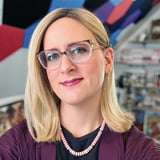Summary
Every enterprise relies on improved key metrics, operational excellence, and better efficiency at scale. And many people love being part of it. But companies need to re-humanize the machines that led them to success. John Taschek, Salesforce’s VP of Strategy, will share his views on how to bring people back to the forefront of competitive intelligence, customer insights, analyst relations, and even pricing and packaging. Doing so means pointing the people who are really good at softer skills to the world outside your own companies. At the same time, it also means developing the internal executive support to make it possible. The outcomes can be frustrating or fun, but in the long game, everyone wins.
Key Insights
-
•
John’s role combines analyst relations, competitive intelligence, pricing, and voice of the customer to create a unified, customer-centered approach.
-
•
Salesforce grew from 300 to nearly 30,000 employees, which introduced challenges in maintaining personal, human connections.
-
•
John hates meetings because they often exclude quiet voices and waste time, advocating for fewer, more meaningful interactions.
-
•
Promoting misfits and introverts brings fresh perspectives and counters the dehumanizing effects of scale and rigid corporate hierarchies.
-
•
Humanizing technology requires separating facts from emotions while integrating both in decision-making to better serve people.
-
•
John pushes for flattening hierarchies to allow direct communication from junior employees to top leadership like CEO Marc Benioff.
-
•
Salesforce’s core values—trust, customer success, innovation, and equality—are key pillars that support humanizing enterprise software.
-
•
The traditional hierarchy of needs flips in scaled technology settings, often reducing users’ agency and empowerment, which must be restored.
-
•
John participated in an unprecedented Vatican hackathon inspired by the Pope’s call to bring tenderness into technology.
-
•
Measuring success should focus on quality of relationships and customer outcomes rather than raw efficiency or interaction counts.
Notable Quotes
"When Trisha said we are fearless, I disagree. I'm totally fearful."
"I don’t know what I do day to day to make anything happen, and maybe that means I have to do less."
"I hate meetings because people just pontificate or take over, and I think all people should resist meetings at all times."
"We can’t call people dummies or idiots just because they struggle with technology; we have to protect their dignity."
"Analysts are paid to call your babies ugly; but many companies hide those reports—I'm pushing all of them up to leadership."
"I want there to be no hierarchy in communication. Even a junior associate should be able to talk directly to CEO Marc Benioff."
"Email is inherently exclusionary—it’s meant for one-to-one or limited groups, but we should use tools that promote transparency."
"The more technology we bring in, the more users lose agency and empowerment, but we need to flip this back."
"I’d rather be known for bringing humanity into the tech world than anything else I’ve done."
"Success is about relationships: one person stopping you in the hallway to say hi is more valuable than many formal meetings."
Or choose a question:
















More Videos

"When you design for the edges, you make things better, more fluid, more customizable for everyone."
Sam ProulxOnline Shopping: Designing an Accessible Experience
June 7, 2023

"We built a career path to make evaluations as fair and consistent as possible across roles."
Ignacio MartinezFair and Effective Designer Evaluation
September 25, 2024

"The pod system gave leads more credibility and leadership opportunities while supporting junior growth."
Sarah Kinkade Mariana Ortiz-ReyesDesign Management Models in the Face of Transformation
June 8, 2022

"The Shaker village sidewalks followed people’s natural inclinations, not forcing unnatural movement."
Daniel GloydWarming the User Experience: Lessons from America's first and most radical human-centered designers
May 9, 2024

"The careful application of structured queries can reveal deeper insights than traditional research alone."
Patrick BoehlerFishing for Real Needs: Reimagining Journalism Needs with AI
June 10, 2025

"Anyone can do a basic AI summary with zero control, but we offer robust, evidence-backed, scalable chat analysis."
Andy Barraclough Betsy NelsonFrom Costly Complexity to Efficient Insights: Why UX Teams Are Switching To Voxpopme
September 23, 2024

"Technology moves faster than policymaking — that’s the pacing problem we need to address."
Alexandra SchmidtWhy Ethics Can't Save Tech
November 18, 2022

"You can’t lead without being a lifelong learner because when your company stops learning, it dies."
Louis RosenfeldDiscussion: What Operations can teach DesignOps
November 6, 2017

"Previously, IBM designers were inventing their own buttons for every product, which exasperated chaos and inconsistency."
Mitchell BernsteinOrganizing Chaos: How IBM is Defining Design Systems with Sketch for an Ever-Changing AI Landscape
September 29, 2021
















